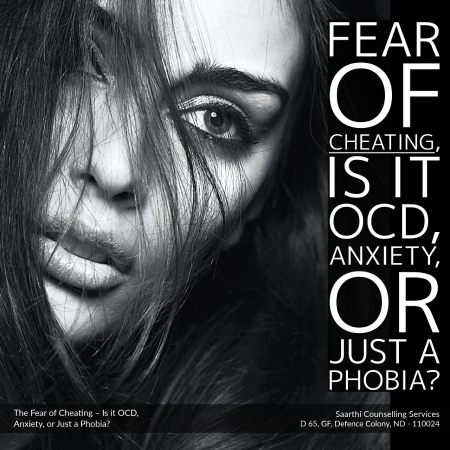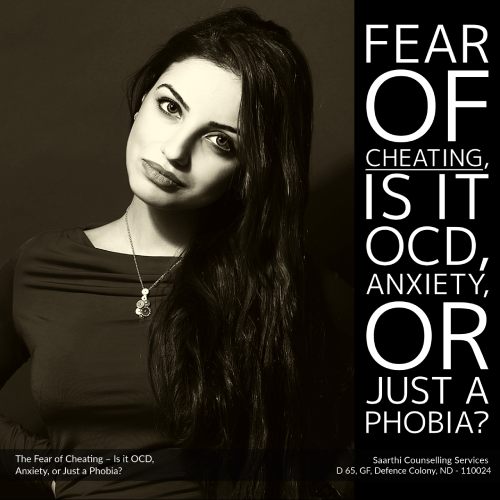All relationships go through several ups and downs. But when the fear of cheating grips you, it’s more than just a passing worry—it’s a relentless anxiety that can suffocate your peace of mind. But what exactly is this fear, and how does it differ from conditions like OCD, Anxiety, or Phobia?
These haunting questions plague the minds of those grappling with the fear of cheating, making it difficult to breathe in peace. Shivani Misri Sadhoo, India’s leading marriage counsellor and couples therapist explains this fear in this article.

What is this Fear of Cheating?
The fear of cheating is characterized by an irrational fear or anxiety of being deceived, betrayed, or cheated on by a romantic partner or someone close. This fear can manifest in various ways, such as excessive jealousy, suspicion, and insecurity in relationships. It is a serious concern about cheating or being cheated on by a romantic partner either in the past, present, or future.
What is the difference between OCD vs. phobia?
Obsessive-Compulsive Disorder (OCD) and phobias are often mixed up but are different psychological conditions. OCD entails persistent intrusive thoughts and repetitive actions to ease anxiety or prevent feared outcomes. For example, Relationship OCD leads to obsessing over a partner cheating and checking messages constantly. In contrast, phobias are irrational fears of specific objects or situations, like the fear of infidelity in a relationship. This can trigger intense anxiety or panic, leading to avoidance behaviors. While both involve fear and avoidance, OCD focuses on intrusive thoughts and compulsive actions, while phobias revolve around specific triggers causing intense fear reactions.
What is the difference between OCD vs. Anxiety?
While OCD involves repetitive behaviors triggered by intense worries, anxiety mainly consists of overthinking without specific actions. For instance, someone with OCD might obsess over cheating in a relationship and constantly check their partner’s phone or follow them around to ensure fidelity.
Conversely, a person with anxiety may also worry about infidelity but won’t engage in compulsive behaviors like checking or following. The key distinction lies in the compulsive actions seen in OCD, where intrusive thoughts lead to repetitive behaviors, whereas anxiety tends to involve excessive worrying without such specific actions.
The fear of trusting people in relationships, known as Pistanthrophobia, differs from OCD-related fears, such as fear of cheating. Pistanthrophobia stems from past experiences, leading to difficulties in emotional intimacy, while OCD fears are often hyper-focused and unrelated to prior events.
Cheating OCD, or relationship obsessive-compulsive disorder (ROCD), involves recurring doubts about a partner’s fidelity or relationship flaws, often triggering intense anxiety and compulsive behaviors like checking phones. Though its exact causes are unclear, genetics, brain chemistry, life events, and past relationships may contribute. While occasional doubts are normal, ROCD intensifies these thoughts into perceived threats, leading to distress and impacting mental well-being and relationships. Unlike typical relationship anxiety, ROCD prompts compulsive responses to alleviate fears, causing significant distress.

What are the Symptoms of ROCD?
- Persistent intrusive thoughts about the relationship or partner
- Excessive worry about partner’s feelings and love
- Overly focused on partner’s flaws
- Doubting if the partner is the right choice
- A constant need for reassurance
- Difficulty concentrating due to relationship-related thoughts
What are the Diagnosis And Treatment of Cheating OCD ROCD?
ERP: Exposure and Response Prevention Therapy (ERP) is a highly effective treatment for Relationship OCD (ROCD). It involves gradually exposing oneself to triggers like unflattering photos of a partner, reducing their power over time. Customized by a specialized therapist, ERP helps individuals confront fears gradually, alleviating anxiety and depression associated with ROCD.
Support Group: Joining a support group for individuals with OCD or ROCD can provide valuable peer support, encouragement, and coping strategies.
It is certainly not an easy task to understand if the fear of cheating is OCD or anxiety or a phobia. But whatever it is, the best course of action is to seek professional support and guidance for the right diagnosis and treatment. Consulting with a therapist can provide clarity and effective strategies for managing these concerns and improving mental well-being.

Shivani Misri Sadhoo is an internationally recommended relationship Counsellor by world’s biggest and most trusted study and research-based foundation for couples therapy – Gottman Institute. She is trained on specialised key relationship counselling Skills from AIIMS, VIMHANS and various other reputed institutions. Counselor Shivani Misri Sadhoo, is also Certified for Emotionally Focused Therapy, Cognitive Behavioral Therapy and Dialectical Behaviour Therapy.
Counsellor Shivani Misri Sadhoo is also a Certified Neuro Linguistic Practitioner with specialised training and experience in the field of affairs/betrayals, trust issues, difficulty communicating, conflicting values, bereavement, grief and loss (affairs, separation, divorce, childhood) and emotional health issue (anxiety, social anxiety, fear, depression, low mood).
Currently, Shivani Misri Sadhoo is one of the top counsellors with the HIGHEST Success Rate with over 17,000 happy couples and individuals (based in India and abroad), who has benefited from her therapy. Psychologist and Counselor Shivani Misri Sadhoo not only practice independently from her clinic in Greater Kailash, Delhi, India but also listed on the panel of eminent hospitals like IBS Hospital – Institute of Brain & Spine, Express Clinic, Fortis (formerly) based in Delhi.



